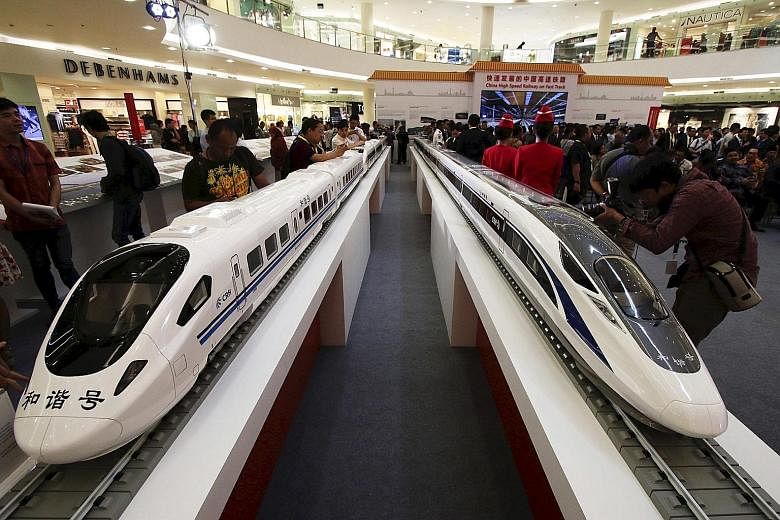Indonesia has scrapped a much- anticipated high-speed rail project between Jakarta and Bandung after months of intense lobbying between China and Japan, opting for a slower train instead.
Analysts warned that the government's reappraisal of the much-anticipated US$5-billion (S$7-billion) deal, and its call for new bids, risked confusing investors in the country's massive infrastructure projects.
President Joko Widodo said yesterday a bullet train to cover the 150km between Jakarta and the textile town of Bandung was not necessary.
"Based on the recommendations of the assessment team, I have decided that we will develop a moderate- speed train, and its development will not use the state budget," said Mr Joko, adding that the government will not be providing a guarantee fund - as Japan had sought - and that the project will be handled on a commercial level between companies and the State-Owned Enterprise Ministry.
The train had been planned as the first instalment of a 763km link between Jakarta and Surabaya and Mr Joko said the government would still consider a high-speed train between the country's two biggest cities.
The decision comes after delays in announcing the winner of the rival bids and the Japanese ambassador to Indonesia, Mr Yasuaki Tanizaki, told reporters: "Consequently, both proposals extended by our government and the Chinese government are not accepted. I have expressed my regrets."
While analysts say the Japan- China rivalry shows that the archipelago remains attractive for investors in infrastructure spending, they warn that more sudden changes could deter them.
"This sends a confusing signal to investors because, even if the country is complex, and decisions are influenced by many factors, they often think in the binary," said Mr Paul Rowland, a Jakarta-based political analyst. "For them, they see it like this - first the president wants foreign investments and seeks bids, then he changes this."
Mr Tom Rafferty, a Beijing-based analyst at the Economist Intelligence Unit, said the project was a priority for China "because it would have been one of the first and most visible manifestations of President Xi Jinping's 'One Belt, One Road' overseas investment drive", Reuters reported. "Chinese firms have not always been sensitive to political risk in foreign markets but on this occasion, the lobbying and marketing effort was extensive. The decision therefore seems likely to dim China's confidence in the Indonesian market."
But transport analysts like Mr Darmaningtyas of the Institute of Transportation Studies said the cancellation of the high-speed train was not a surprise because it was out of step with larger infrastructure priorities.
"Indonesia has other islands which need critical infrastructure, such as in Kalimantan, Maluku, Papua," he told The Straits Times. "It does not makes sense to focus on a lavish project like this, when there is already a competent train service connecting Jakarta and Bandung."
Similar sentiments were expressed by Transport Minister Ignasius Jonan. "If the high-speed train journey is supposed to clock in under 40 minutes over that distance but you have stops, then… do you think the full velocity can be reached? I don't think so," he said.
This was among the reasons the idea was dropped, said Coordinating Economic Minister Darmin Nasution on Thursday after a five-hour meeting with other ministers.


